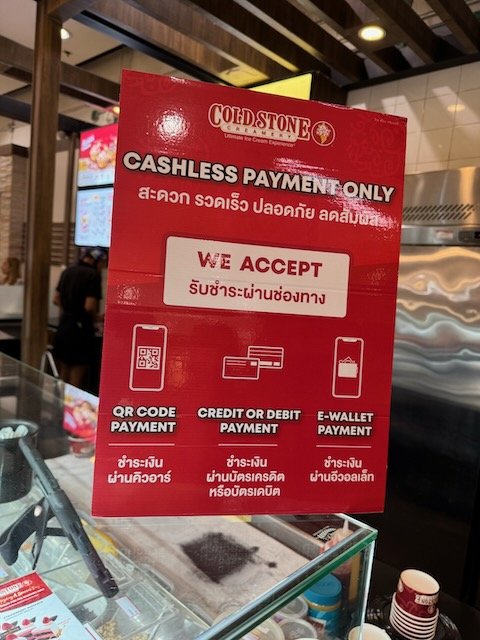
lkn
Advanced Member-
Posts
1718 -
Joined
-
Last visited
lkn's Achievements
-
Payment QR Codes
lkn replied to WalsallRobbo's topic in Jobs, Economy, Banking, Business, Investments
The problem is not cashless per se, it’s how they go about it. There is nothing preventing BOT / TAT from doing a “Thai payment app” where you add your debit/credit card, and then it allows you to scan QR codes with the funds being taken from your payment card. The problem is that if you are American, there will be a 3-5% fee for taking the funds from your payment card, and I believe to get a payment agreement with VISA/MasterCard, they have made it so that this fee must not be charged to the owner of the card. This is of course what is f’ed up — in Europe we have introduced legislation that cap the payment card interchange fees to 0.11% for debit cards and 0.13% for credit cards. This means that in many European countries you can use your payment card everywhere, and I really mean everywhere! -
Payment QR Codes
lkn replied to WalsallRobbo's topic in Jobs, Economy, Banking, Business, Investments
I am from a country with such law, we introduced it forty years ago or so, after the introduction of the first payment card which made some people worry they would soon be unable to pay with their cash. But today we have amended the law, because cash can be a problem in many situations, for example self-service kiosks etc. do not need to accept cash, nor do businesses after (I think) around 22:00, and businesses in “remote areas” (for example a gas station) can apply for an exemption. Furthermore, today it is actually illegal for a business to accept payment in cash if it is above a certain threshold (about 100,000 baht), though this has to do with AML and therefore not really comparable to the other amendments (which is more about security or practicality). Though my point simply is, some countries do have these laws, but they are from another time, and are likely to change, so I don’t see such law being introduced today (in Thailand, or anywhere else). -
-
They have a minimum purchase requirement when paying with card (wallet app). They waived the fee during COVID, but unfortunately re-instated it about a year ago. But Family Mart, BigC / BigC Mini, TOPS, etc. all take cards / NFC / wallet apps w/o minimum payments. So does most shops at the mall, Central Department Store, Robinson, and larger restaurants. You can almost assume that if the place take VISA/MasterCard, they have a reader that does NFC and thus also support GooglePay and the other wallet apps.
-
Bangkok Bank App Sending funds to UK
lkn replied to jasonr3255's topic in Jobs, Economy, Banking, Business, Investments
I was asked whether it was a requirement that funds only be sent to accounts abroad bearing the sender’s name, i.e. repatriating funds rather than paying a 3rd party abroad. Though having now looked again at their interface and terms, I see no requirement that funds only be sent to yourself, and it might also be difficult for them to enforce. Anyway, for your case, sending money to yourself, as long as it is less than 1.5M baht and in one of their 38 supported currencies, it should work fine. -
Bangkok Bank App Sending funds to UK
lkn replied to jasonr3255's topic in Jobs, Economy, Banking, Business, Investments
It is in my name, and the process (adding it via iBanking) did require manual approval, so it wouldn’t surprise me, if they only allow accounts in your own name by default. I btw noticed while checking my iBanking that the 1.5M baht limit is explicitly mentioned. I can’t get to the “Add New Account” screen at the moment (to see if there are any requirements mentioned), as apparently this functionality is only available within office hours on bank days. -
You need a phone with a selfie camera. I think you are conflating the phone’s biometrics with the new face scan requirements. For the bank’s face scan, you need to have previously visited the branch, where they will take your photo, and when you use the app, they compare the live video from your selfie camera with the photo on record. It may even give you instructions such as “smile and show teeth” or “blink 3 times”. How easily the recognition can be fooled, I do not know, but it should prevent someone who obtains your phone + passcode to empty your accounts.
-
Kasikorn does not require it (for foreigners). I don’t like the face scan either, nor the daily limits, or limits per transaction. But presumably they have introduced all this stuff because a lot of citizens are just not very literate and just give their phone + passcode to strangers that can then steal their money (without this face scan requirement). I recently asked a Thai how they managed to log into LINE from their friend’s phone, and the reply was that there’s a guy that help them with all their phone issues. Probably this is quite normal, and probably these “computer wizards” get a lot of sensitive data that would allow them to steal a lot of funds…
-
They will convert on-the-fly, so you can keep your balance in GBP but still use it for THB purchases or in ATMs.
-
Right, China is hardly doing this covertly. And even without plans to invade Taiwan (and risk getting all their USD frozen, as we saw with Russia after their invasion of Ukraine), there is increasing tension between the U.S. and China, so it’s not really that surprising, that China wants less exposure to USD, and for them, gold is probably the second best thing.
-
Price of water is based on consumption, so there is no fixed price, and building will pay one bill to the provincial water authority for all of the building’s consumption, i.e. including common areas, and it’s then up to the building to try to split this bill. I tried to calculate a “fair price” for our co-owners and ended up with 25 baht per unit.
-
Buying gold at a gold shop
lkn replied to watgate's topic in Jobs, Economy, Banking, Business, Investments
Some shops may also have additional fees when buying/selling. Granted, I asked about jewellery, and for this there was a design fee when buying and a “melting fee” when selling, though I also asked about the bullions, and apparently the price shown on their digital display was only for members, I didn’t bother asking what it required to become a member because it just seemed like gold in Thailand is a way to extract money from financial illiterate people… -
You might get a better rate for higher amounts. I did about 12 million with Bangkok Bank and got a rate 0.75% worse than the ECB rate for the same day, which is the mid-market rate, so no bank (even Revolut) would actually give me the ECB rate. But as others have pointed out, you are in the mercy of Thai financial institutions, because THB cannot be sent abroad, so your best option is to check which Thai bank will give you the best rate.
-
Bangkok Bank App Sending funds to UK
lkn replied to jasonr3255's topic in Jobs, Economy, Banking, Business, Investments
Here is what Bangkok Bank have told me: If you transfer more than one million abroad, you need to go to the branch with paperwork (source of funds) and those have to be approved centrally (so this may take a few hours to complete because of the central approval step). If you transfer less than one million it is “personal expenses” and you can do this yourself via iBanking (desktop), though not mBanking (phone app). I have the mBanking app and I do not see an option to do international transfers. I also have iBanking and here I do have an option to do a new international transfer, but it require that you first add the account you want to transfer money to, then wait 1-2 days for Bangkok Bank to approve it, and now you can do transfers to this account. I did add my home country bank account and if I select “New Intl. Transfer”. My transfer limit is stated in foreign currency, but it amounts to just short of 1.5 million THB, so that might be the actual limit for what is considered “personal expenses”. I have done one international transfer from Bangkok Bank, the fee was 1,250 baht and they gave me an exchange rate 0.75% below mid-market rate. -
I can now confirm that indeed, there is a bell! I was there around 21:45 and it seemed empty, but at the counter there is a hotel-style bell that you can ring, and someone comes out to help you. I also asked about the “VAT Refund for Tourists” app that they advertize, and which I had previously downloaded only to fail at entering my “VAT Invoice ID” — turns out that this only works with a subset of VAT receipts.












